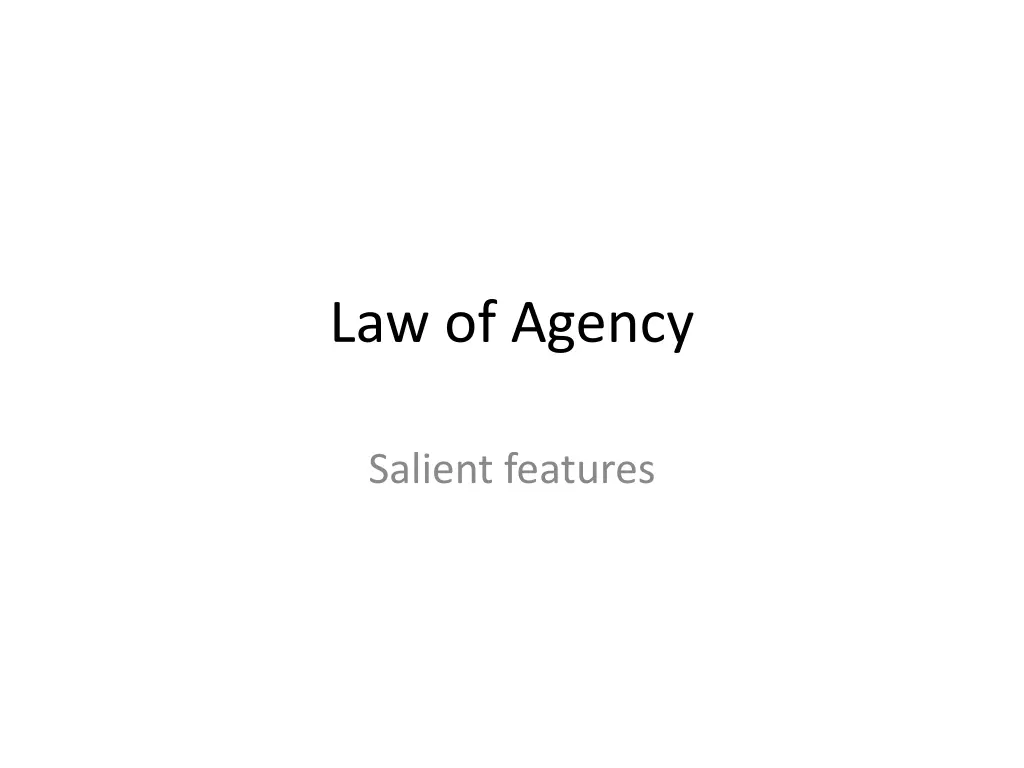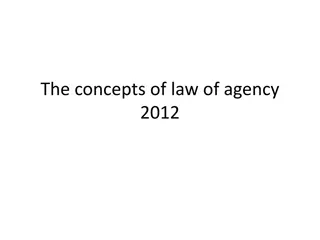
Key Features of Law of Agency Explained
Learn about the salient features of the law of agency, including the nature of agency, representative capacity, authority, estoppel, ratification, and the relationship between principal and agent. Discover the duties of an agent and the importance of acting in good faith to avoid conflicts of interest. Dive into the principles governing the relationship between principal and agent in legal transactions.
Uploaded on | 3 Views
Download Presentation

Please find below an Image/Link to download the presentation.
The content on the website is provided AS IS for your information and personal use only. It may not be sold, licensed, or shared on other websites without obtaining consent from the author. If you encounter any issues during the download, it is possible that the publisher has removed the file from their server.
You are allowed to download the files provided on this website for personal or commercial use, subject to the condition that they are used lawfully. All files are the property of their respective owners.
The content on the website is provided AS IS for your information and personal use only. It may not be sold, licensed, or shared on other websites without obtaining consent from the author.
E N D
Presentation Transcript
Law of Agency Salient features
Nature of agency When one person, the agent concludes juristic act for or behalf of another, who is called the principal with the result that a legal tie arises between the principal & a third party.
Representative capacity To conclude juristic acts o behalf of another. Lack of authority may be cured by ratification.
Authority Express agreement between principal and agent. Formal appointment eg written power of attorney.
Authority by operation of law Guardian and minor Curator and an insane person Director and company
Estoppel If the principal has created false impression that another person has the authority to conclude juristic on his behalf, & third party then act to his detriment on the strength of that impression, the principal can be prohibited from denying such authorisation.
Ratification Validation by a person of a juristic act concluded on his behalf by another who did not have the authority to do so.
Relationship between Principal and Agent If agent acts on behalf of someone else intention should be apparent to the other party.
Duties of the agent a) He is obliged to follow his instructions b) He must exercise care and diligence c) The agent must show good faith
The agent must show good faith Secret profits all profits acquired by the agent in agency transactions is acquired for the principal. - Director must account for corporate opportunity.
The agent must show good faith Conflicts of interest: There must be disclosed to the principal
The agent must show good faith Abuse of confidential information: He may not misuse confidential information obtained through fiduciary relationship with his principal.
Duties of the agent d) The agent must account properly
Duties of the principal He must reimburse the agent for expenses incurred in the exercise of a lawful instruction. He remunerate the agent for his services.
Personal Liability of the Agent 1. He can bind himself by way of agreement as against the third party by warranting that he has necessary authority
2. A person who falsely represents that he has authority to conclude juristic acts on behalf of another can be liable in delict if the third person acts on his belief of this misrepresentation.
3. The agent can also tacitly warrant he has acquired authority.
Where the representative acts for an undisclosed principal he can also incur liability.






















